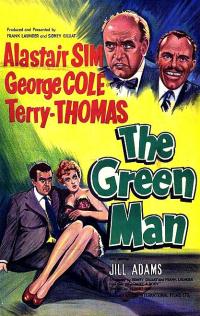
Assassin Harry Hawkins (Alastair Sim), who specialized in eliminating insufferable blowhards, comes out of retirement to bump off egotistical Sir Gregory Upshott (Raymond Huntley). Unfortunately for Hawkins, a minor mistake has put incompetent vacuum-cleaner salesman, William Blake (George Cole), and sexy bride-to-be, Ann Vincent (Jill Adams), on his tail. They all head to The Green Man inn, where Sir Gregory was planning a bit of fun with one of the young girls from the typing pool, but things don’t work out as anyone planned.
Let’s get the most important part out of the way at the beginning: The Green Man is a brilliant, witty farce that never gets old. Go see it. If you can’t find it on TV or at a revival theater, buy an all-region DVD player and order the disk from England. It will be well worth it.
I originally put The Green Man on my list of the ten most important Post-War British Comedies. It is so iconic and so perfectly constructed that I’ve always thought of it as a centerpiece of the movement. But, I must admit that it didn’t change cinema history in any substantial way. It is an excellent representation of the type, but not an influence. The best films aren’t always the most important. That’s OK; I’m happier watching one of the best.
Those “best elements” start with the writing-directing-producing team of Frank Launder and Sidney Gilliat (The Happiest Days of Your Life, The Belles of St. Trinian’s, Blue Murder at St. Trinian’s, The Pure Hell of St. Trinian’s, The Smallest Show on Earth). Here they stick to producing and writing, crafting the script from their own stage play. The major change was enlarging the part of Hawkins, making the film more of a vehicle for Alastair Sim (always a good idea if you have Sim around). The story is a rollicking tale of mistaken identities, miscommunication, infidelity, and murder. It earns its “black comedy” label with a few quick assassinations, and then the misadventures of a women who just won’t die (though her body keeps getting found). In a voice-over, Hawkins makes it all perfectly reasonable to kill puffed-up, self-important fools, and as his newest target, Sir Gregory Upshott, fits the bill, it’s impossible not to cheer him on. But Hawkins is only half the film. An equal amount of screen time (if not a touch more) goes to young, innocent William and Ann, who are so nice, yet so bumbling, that I was on their side as well. By the end, I was for everyone, except Sir Gregory, of course.
The laughs don’t come only from the farcical elements. The Green Man is also a biting satire of British society, politics, and culture. The overly-moral English veneer is shown to be a lie as practically everyone is sleeping around. The politicians are all less than useless, and the arts are made out to be a joke. One of the best moments comes when Ann Vincent’s fiancée (named Reginald Willoughby-Cruft, which should be enough to see where he fits in the story) reads his poetry. As William wisely points out upon hearing that Reginald has forgotten the text for his modern poem, “that’s OK, he can make it up as he goes along.”
But it isn’t the story, or the satire, that makes this one of the funniest movies you’re likely to find. It’s the cast. George Cole, famous for his spiv roles (for us American folks, a “spiv” is a small time British crook who supplied black market goods; he’s generally an affable character on screen though less so in reality) shows that he could be a leading man. He has a talent for physical comedy but is even better with subtle, and not-so-subtle expressions and vocal tones. His teaming will Jill Adams is perfect. She is charming and as funny as Cole. It is unfortunate that she had few other memorable roles.
Then there is Alastair Sim, the finest comedian of his age (or any age that I’m aware of). Known primarily on this side of the Atlantic for his portrayal of Scrooge in the 1951 A Christmas Carol/Scrooge, his genius shone in comedy. With a deep mellifluous voice that could boom orders or softly seduce, a shining bald head, large expressive eyes, and a smile that could be contagious or frightening, Sim was a master and he was never better than in The Green Man. Sim’s Hawkins using pantomime to coax the three middle-aged members of a string quartet out for a quick drink is one of the great routines of cinema.
All of the supporting players are first rate. In particular, Terry-Thomas, given third billing over Jill Adams for a relatively minor role, plays the nice-but-lecherous cad, Charles Boughtflower, as only he can. Raymond Huntley is the personification of pompous, and puts in another fine performance.
The Green Man has no slow moments, no weak cast members, and allows no reason for you not to rush to see it except availability.